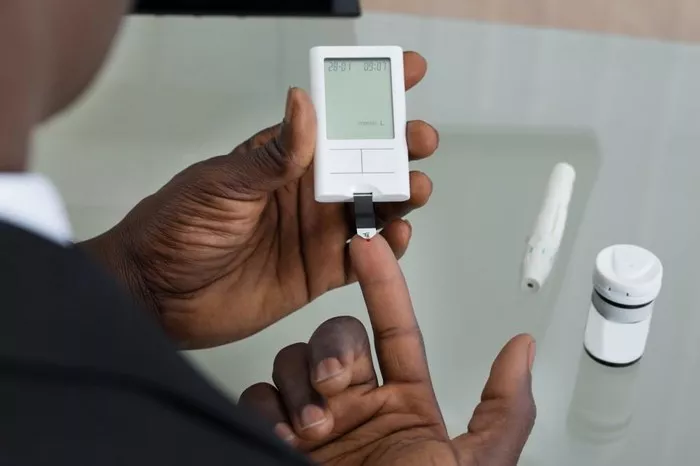Understanding Hyperthyroidism
Hyperthyroidism occurs when the thyroid gland, located in the neck, produces excessive amounts of thyroid hormones, primarily thyroxine (T4) and triiodothyronine (T3). These hormones regulate the body’s metabolism, influencing various processes such as heart rate, temperature, and energy expenditure. The most common causes of hyperthyroidism include Graves’ disease, toxic multinodular goiter, and thyroiditis.
- Graves’ Disease: An autoimmune disorder where the immune system attacks the thyroid gland, leading to overproduction of thyroid hormones.
- Toxic Multinodular Goiter: Characterized by multiple overactive thyroid nodules producing excess hormones.
- Thyroiditis: Inflammation of the thyroid gland causing temporary hyperthyroidism.
Hyperthyroidism and Glucose Metabolism
The relationship between thyroid hormones and glucose metabolism is complex and multifaceted. Thyroid hormones significantly impact various organs and tissues involved in glucose homeostasis, including the liver, muscles, and pancreas. The mechanisms through which hyperthyroidism causes hyperglycemia include:
- Increased Hepatic Gluconeogenesis: Thyroid hormones stimulate the liver to produce more glucose through gluconeogenesis, a process that converts non-carbohydrate substrates into glucose. This leads to an increase in blood glucose levels.
- Enhanced Glycogenolysis: Thyroid hormones promote the breakdown of glycogen into glucose in the liver, further contributing to elevated blood glucose levels.
- Altered Insulin Sensitivity: Hyperthyroidism can decrease the sensitivity of tissues to insulin, a hormone essential for glucose uptake by cells. This insulin resistance results in higher blood glucose levels.
- Increased Gastrointestinal Absorption of Glucose: Thyroid hormones enhance the absorption of glucose from the gastrointestinal tract, leading to higher postprandial (after meal) blood glucose levels.
- Changes in Hormonal Regulation: Hyperthyroidism can affect the secretion and action of other hormones involved in glucose metabolism, such as glucagon and catecholamines, which can further exacerbate hyperglycemia.
The Role of the Liver in Hyperglycemia
The liver plays a central role in maintaining blood glucose levels. Under normal conditions, it balances glucose production and storage. However, in hyperthyroidism, this balance is disrupted, leading to increased glucose production.
- Gluconeogenesis: The liver produces glucose from non-carbohydrate sources, such as amino acids and glycerol. Thyroid hormones increase the expression of key enzymes involved in gluconeogenesis, such as phosphoenolpyruvate carboxykinase (PEPCK) and glucose-6-phosphatase, leading to enhanced glucose production.
- Glycogenolysis: The breakdown of glycogen into glucose is another pathway through which the liver contributes to blood glucose levels. Thyroid hormones increase the activity of glycogen phosphorylase, the enzyme responsible for glycogenolysis, resulting in more glucose being released into the bloodstream.
Insulin Resistance in Hyperthyroidism
Insulin resistance is a condition where the body’s cells become less responsive to the effects of insulin, leading to elevated blood glucose levels. In hyperthyroidism, several factors contribute to the development of insulin resistance:
- Increased Lipolysis: Thyroid hormones stimulate the breakdown of fats (lipolysis), leading to elevated levels of free fatty acids in the blood. High levels of free fatty acids can interfere with insulin signaling pathways, reducing the effectiveness of insulin.
- Altered Adipokine Levels: Adipokines are hormones produced by adipose tissue that regulate glucose metabolism. Hyperthyroidism can alter the levels of adipokines, such as adiponectin and leptin, contributing to insulin resistance.
- Oxidative Stress: Increased metabolic activity in hyperthyroidism leads to higher production of reactive oxygen species (ROS), causing oxidative stress. Oxidative stress can impair insulin signaling and contribute to insulin resistance.
The Pancreatic Response to Hyperthyroidism
The pancreas plays a critical role in glucose homeostasis by producing insulin and glucagon. Hyperthyroidism affects pancreatic function in several ways:
- Increased Insulin Secretion: Initially, the pancreas may respond to elevated blood glucose levels by increasing insulin secretion. However, chronic hyperglycemia can lead to pancreatic beta-cell dysfunction and a subsequent decline in insulin production.
- Altered Glucagon Secretion: Glucagon, a hormone produced by alpha cells in the pancreas, raises blood glucose levels by promoting gluconeogenesis and glycogenolysis in the liver. Hyperthyroidism can increase glucagon secretion, further contributing to hyperglycemia.
Gastrointestinal Absorption of Glucose
Thyroid hormones influence the rate at which glucose is absorbed from the gastrointestinal tract. Hyperthyroidism can increase the expression of glucose transporters in the intestinal lining, enhancing the uptake of glucose into the bloodstream. This leads to higher postprandial glucose levels and contributes to overall hyperglycemia.
Hormonal Regulation and Hyperglycemia
In addition to insulin and glucagon, several other hormones play a role in glucose metabolism. Hyperthyroidism can alter the secretion and action of these hormones, further contributing to hyperglycemia:
- Catecholamines: Thyroid hormones increase the production and release of catecholamines (epinephrine and norepinephrine) from the adrenal medulla. Catecholamines stimulate glycogenolysis and gluconeogenesis, raising blood glucose levels.
- Cortisol: Hyperthyroidism can affect the hypothalamic-pituitary-adrenal (HPA) axis, leading to increased cortisol production. Cortisol promotes gluconeogenesis and reduces glucose uptake by tissues, contributing to hyperglycemia.
- Growth Hormone: Thyroid hormones can enhance the secretion of growth hormone, which has anti-insulin effects and can increase blood glucose levels.
Clinical Implications and Management
The relationship between hyperthyroidism and hyperglycemia has significant clinical implications, particularly for patients with diabetes. Managing hyperthyroidism in diabetic patients can be challenging, as both conditions can exacerbate each other. Effective management strategies include:
- Thyroid Function Testing: Regular monitoring of thyroid function is essential in diabetic patients, especially if they exhibit symptoms of hyperthyroidism.
- Medication Adjustment: Anti-thyroid medications, such as methimazole or propylthiouracil, can help control thyroid hormone levels and mitigate their effects on glucose metabolism. Dosages of diabetes medications may also need adjustment.
- Monitoring Blood Glucose Levels: Frequent monitoring of blood glucose levels is crucial in patients with hyperthyroidism and diabetes to detect and manage hyperglycemia promptly.
- Diet and Exercise: A balanced diet and regular physical activity can help improve insulin sensitivity and manage blood glucose levels. Patients should work with healthcare providers to develop individualized dietary and exercise plans.
- Treatment of Underlying Thyroid Condition: In cases where hyperthyroidism is due to Graves’ disease or toxic multinodular goiter, definitive treatments such as radioactive iodine therapy or surgery may be necessary to achieve long-term control of thyroid hormone levels.
See also: What are the Causes of Hyperglycemia in Diabetes
Conclusion
Hyperthyroidism, through its complex interactions with various metabolic pathways, can lead to hyperglycemia. The increased production of thyroid hormones affects glucose metabolism by stimulating hepatic gluconeogenesis, enhancing glycogenolysis, altering insulin sensitivity, increasing gastrointestinal absorption of glucose, and affecting the secretion and action of other hormones involved in glucose regulation. Understanding these mechanisms is crucial for effectively managing patients with both hyperthyroidism and diabetes. Regular monitoring of thyroid and blood glucose levels, appropriate medication adjustments, and lifestyle modifications are key components of managing hyperglycemia in the context of hyperthyroidism. Through comprehensive care, patients can achieve better control of both conditions and improve their overall health outcomes.
Related topics:
What Medications are Used to Treat Hyperglycemia
























